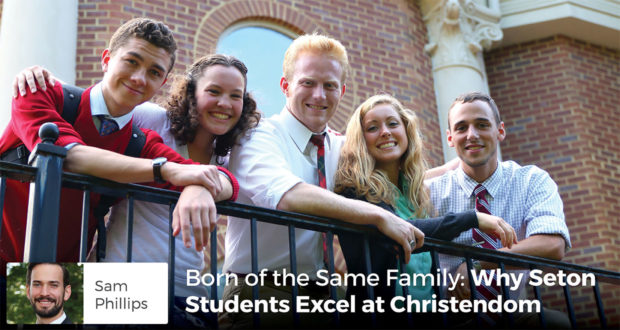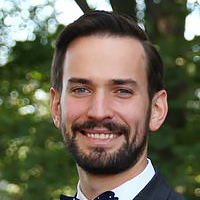Summary
Sam Phillips asserts that shared roots and a common educational backdrop make Christendom a natural transition from Seton Home Study to higher education.With a similar vision of Catholic education and a shared commitment to providing a rigorous curriculum, Christendom College is a natural transition for a graduate of Seton Home Study.
We share more in common, however, than simply material and structure. These two highly regarded academic institutions work perfectly together because they were founded by a husband-wife team for whom the Catholic Faith was always a priority.
Mrs. Ann Carroll founded Seton Home Study to help parents take a more active role in their children’s education, while our founder, Dr. Warren Carroll, started Christendom College so students could become “history makers” through a traditional, liberal arts education that was informed by and infused with the richness of the Faith—so often absent or even under attack at most universities.
This common educational backdrop and these shared roots make Christendom a natural and perfect transition from Seton Home Study to higher education.
For example, both institutions emphasize extensive reading and writing to form the basis of the educational experience. Both require students to read important works of Western Civilization, and then, having grappled with these texts, write carefully considered examinations.
Unlike secular universities, which often attempt to shove secularist worldviews down the throats of their students, Christendom and Seton both teach from the fullness of the Faith, enabling students to pursue the Truth and grow in wisdom rather than having to be always on the defensive.
Classes that remain faithful to the Magisterium in every area might sound too good to be true, but that is exactly what Seton and Christendom students experience.
This emphasis on reading and writing paired with promotion of the Truth contained within the Catholic Faith is augmented by the liberal arts tradition which both schools uphold.
The Carrolls knew how effectively the liberal arts formed well-rounded people, able to think critically in all situations, thus both their academic programs study the core subjects. At Christendom, Seton grads transition quickly to the challenge and increased rigors of college work because of their solid preparation.
At Christendom, all students are required to study a rigorous curriculum, where they are exposed to the classics in every area and expected to have an intellectual response to what they have learned.
Having studied in a writing-intensive program where they are regularly graded, critiqued, and challenged to improve, Seton grads have the experience and preparation needed to succeed at Christendom.
Aside from the fantastic academics, both institutions operate with the intention of sustaining and increasing the faith of their students. Many who fall away from the Church do so during the college years—when pressures planted in high school climax in the immoral college environment.
The Carrolls recognized that the most important thing their educational programs could do is to help students grow in knowledge while demonstrating the important role that the Church has played throughout history, and affirming the lasting importance of a faith that remains steadfast.
Dr. Mary Kay Clark, the Director of Seton Home Study, testified to the value of Christendom’s faith-based, liberal arts education when she said,
“I think the work that Christendom College is doing is tremendous. It is training the leaders of the future. It is giving them a strong education in theology, and philosophy, and political science that is rarely available elsewhere….I sent all seven of my sons there and, to this day, they are all still Catholic.”
As the Admissions Director at Christendom, I have personally witnessed the way Seton students succeed here. Just looking at the statistics from recent years demonstrates that Seton graduates are prepared to excel at our college.
In the graduating classes of 2014 and 2015, both the valedictorians and salutatorians were graduates of Seton Home Study. And in the last number of recruiting years, an average of 95% of the applicants from Seton were accepted to Christendom, with over 52% of them receiving academic scholarships.
These facts are not unusual, but rather what is expected from Seton students, who have consistently shown their ability to soar wherever they apply themselves academically, just like the Christendom graduates who rise to the top in the diverse career fields they enter after graduation.
I would like to invite all Seton graduates to give serious consideration to joining us at Christendom, where you can be assured that you will receive an exceptional, time-tested liberal arts education in a supportive and Christ-centered environment.
College is not the time to allow the beautiful things, the “permanent things,” you learned at home and through Seton to wither and be forgotten, but rather the time to nourish them so that they grow and flourish into skills that form your mind and equip you for success after graduation.
And don’t worry. If you think that because you received such a great education at Seton, you will not benefit from a Christendom education, let me assure you that that is not the case.
You will, though, delve deeper into some of the same subjects of which you have only currently touched the surface, and you will expand your mind in such a powerful way that you will be able to master any subject matter – no matter how complex.

 Seton Magazine Catholic Homeschool Articles, Advice & Resources
Seton Magazine Catholic Homeschool Articles, Advice & Resources


